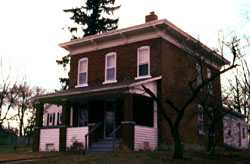Wilson Bruce Evans House
|
Wilson Bruce Evans House | |
 | |
 | |
| Location | 33 E. Vine St., Oberlin, Ohio |
|---|---|
| Coordinates | 41°17′19″N 82°12′59″W / 41.28861°N 82.21639°WCoordinates: 41°17′19″N 82°12′59″W / 41.28861°N 82.21639°W |
| Built | 1856 |
| Architect | Unknown |
| Architectural style | Italianate |
| Governing body | Private |
| NRHP Reference # | 80003143 |
| Significant dates | |
| Added to NRHP | April 16, 1980[1] |
| Designated NHL | December 9, 1997[2] |
Wilson Bruce Evans House, also known as LOR-239-21, is a house in Oberlin, Ohio and was a major stop on the Underground Railroad. It was declared a National Historic Landmark in 1997.[2][3]
History
The Evans house was the home of Wilson Bruce Evans, a prominent African-American abolitionist and early benefactor of Oberlin College, the first college to admit students of color. Evans rose to national attention after his importance in the 1858 Oberlin-Wellington Rescue, one of the events that challenged the controversial Fugitive Slave Act of 1850.[4] Although Evans was not an outspoken abolitionist like his colleagues Sojourner Truth and Frederick Douglass, Evans was cited as a man who "put justice above his own safety." The house was a frequent stop for travelers on the Underground Railroad such as Harriet Tubman.[5]
See also
References
- ↑ "National Register Information System". National Register of Historic Places. National Park Service. 2007-01-23.
- ↑ 2.0 2.1 "Wilson Bruce Evans House". National Historic Landmark summary listing. National Park Service. Retrieved 2008-04-29.
- ↑ "National Register of Historic Places Inventory-Nomination:" (pdf). National Park Service. , 19. Check date values in:
|date=(help) and Accompanying seven photos, exterior and interior, from 1996 PDF (32 KB) - ↑ "Wilson Bruce Evans House". NPS. Retrieved 8 April 2013.
- ↑ "Evans House". National Park Service. Retrieved 8 April 2013.
External links
| ||||||||||||||||||||||||||